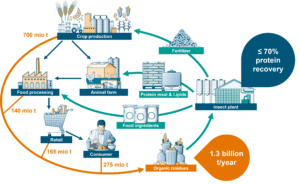- Administrator
- Black Soldier fly, BSF, circular economy, Cricket, FRASS, Innovafeed, Insect oil, Insect proteins, Meal Worm, Ynsect
- 0
Insects in a circular economy

To appreciate the role of insects in a circular economy, we probably should start by defining what “circular economy” is.
“A circular economy is defined as an alternative to the current linear economy in which we take resources, produce, consume and generate waste. In a circular economy, systems and products are designed to eliminate the concept of waste, by enabling the recovery and reuse of all materials at the highest value possible at all times.” That is according to David Greenfield of the Circular Economy Institute.
The keywords are “recovery” and “reuse” of ALL Materials.
Instead of primarily harvesting raw materials to produce goods that wind up incinerated, or in oceans or landfills, the circular economy offers an alternative where stuff is deliberately reused, repaired and recycled over and over again. Our demand for resources way outstrips the earth’s ability to regenerate or replenish.
With respect to insects, their contribution to the circularity is enormous. The insects are fed waste streams from agriculture, agro-industries, human kitchen wastes, food production and sometimes human and animal waste. In turn, insects bio-convert those wastes into three main products: Proteins, fat, (chitin) and FRASS (fertiliser).
By converting waste, insects “upcycle” and help recover over 70% of the protein nitrogen.
